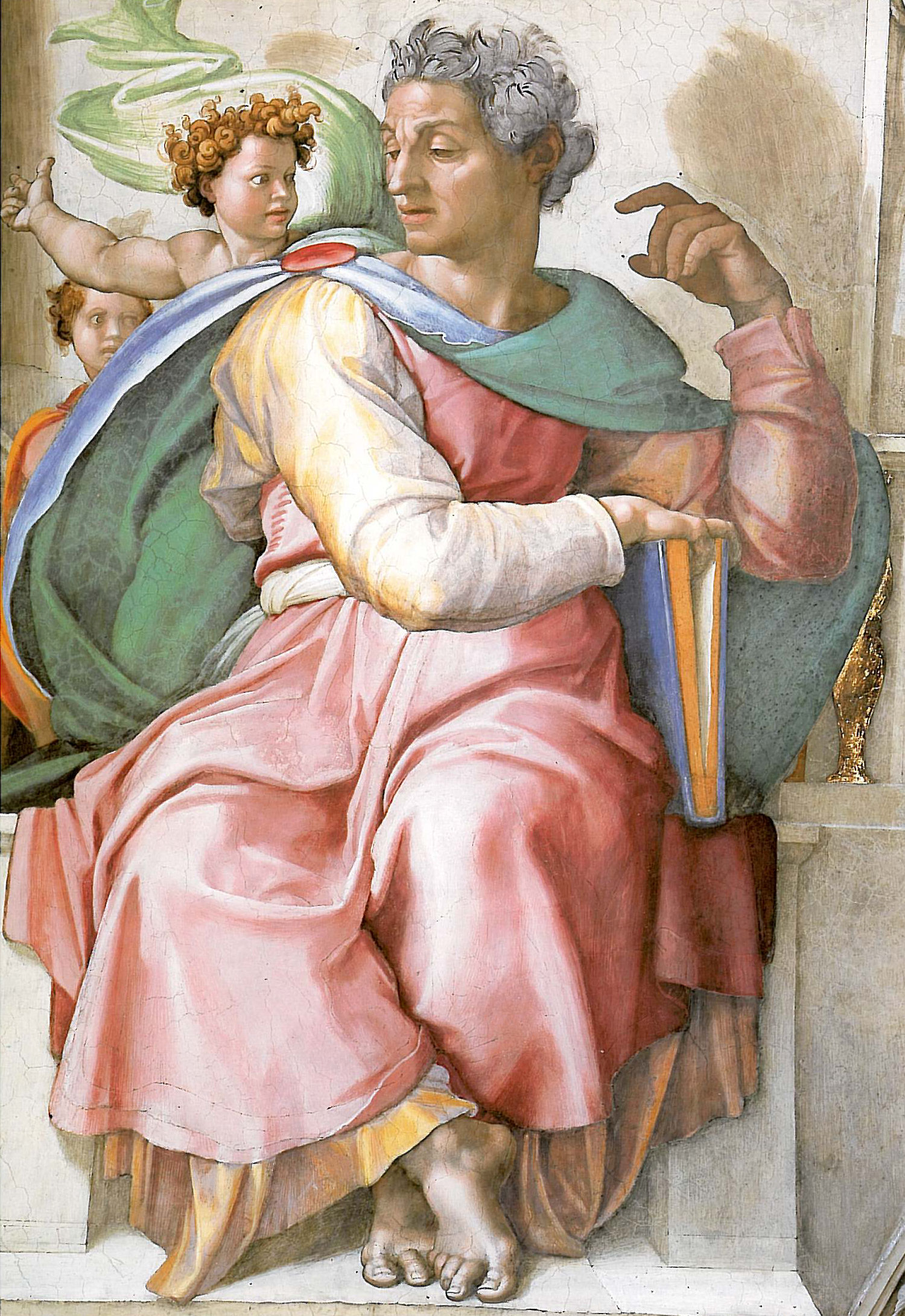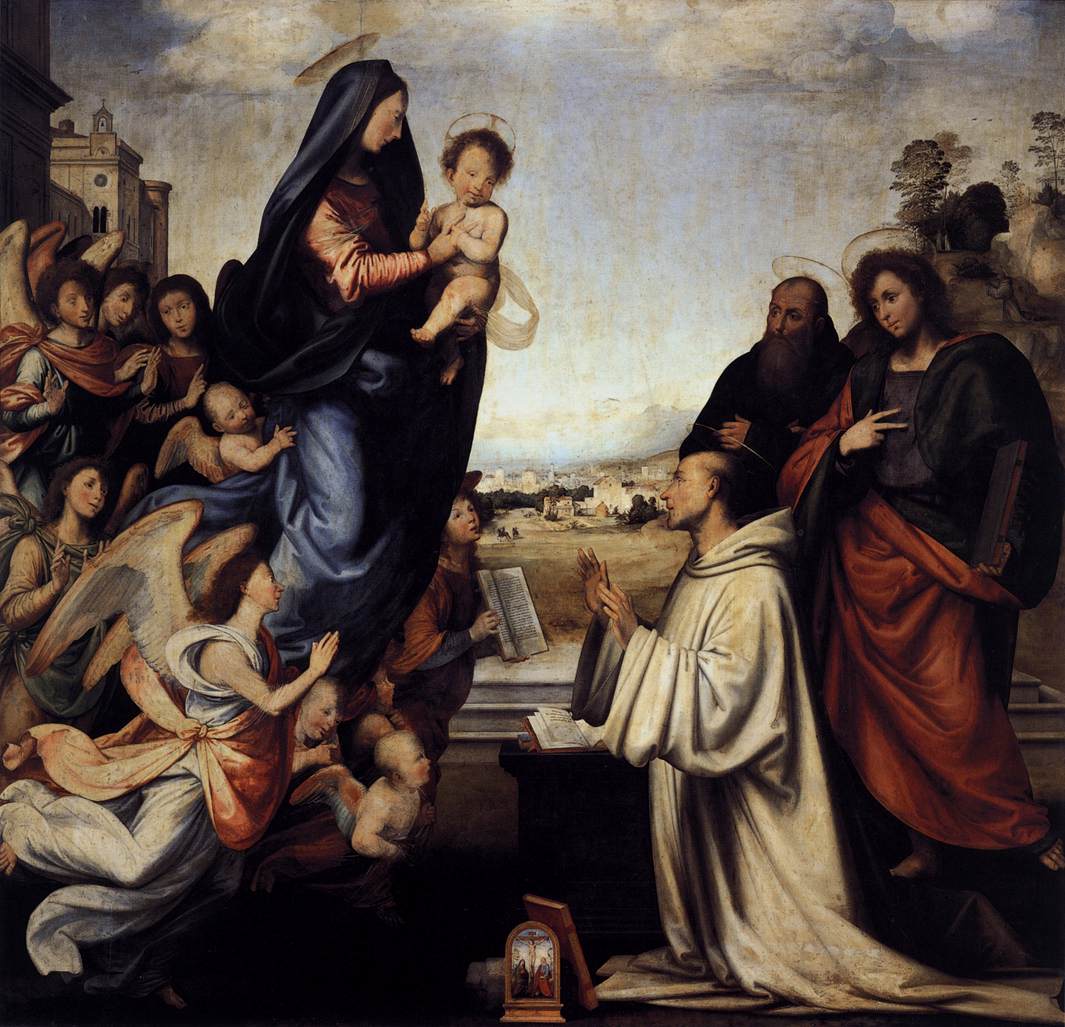
-Prophet Isaiah by Michelangelo, fresco, Sistine Chapel, 1508~1512, please click on the image for greater detail.
The “O Antiphons” refer to the seven antiphons that are recited (or chanted) preceding the Magnificat during Vespers of the Liturgy of the Hours. They cover the special period of Advent preparation known as the Octave before Christmas, December 17-23, with December 24 being Christmas Eve and Vespers for that evening being for the Christmas Vigil.
Introduction
On the evening of December 17 the final phase of preparation for Christmas begins with the first of the great “O Antiphons” of Advent. These prayers are seven jewels of liturgical song, one for each day until Christmas Eve. They seem to sum up all our Advent longing for the Savior.
The “O Antiphons” are intoned with special solemnity in monasteries at Vespers, before and after the Magnificat, Mary’s prayer of praise and thanksgiving from the Gospel of Luke (1:46-55), which is sung every evening as the climax of this Hour of the Divine Office.
A vestige of the “Great O’s” can be seen in verses of the familiar Advent hymn, “O Come, O Come Emmanuel”.
The importance of “O Antiphons” is twofold:
Each one highlights a title for the Messiah: O Sapientia (O Wisdom), O Adonai (O Lord), O Radix Jesse (O Root of Jesse), O Clavis David (O Key of David), O Oriens (O Rising Sun), O Rex Gentium (O King of the Nations), and O Emmanuel.
Also, each one refers to the prophecy of Isaiah of the coming of the Messiah.
Let’s now look at each antiphon with just a sample of Isaiah’s related prophecies:
1. Come, Wisdom of our God Most High, guiding creation with power and love: teach us to walk in the paths of knowledge.
(O Sapientia, quae ex ore Altissimi prodisti, attingens a fine usque ad finem, fortiter sauviterque disponens omnia: veni ad docendum nos viam prudentiae.)
O Come, Thou Wisdom from on high, who orderest all things mightily; to us the path of knowledge show, and teach us in the way to go.
O Sapientia: “O Wisdom, O holy Word of God, you govern all creation with your strong yet tender care. Come and show your people the way to salvation.” Isaiah had prophesied, “The spirit of the Lord shall rest upon him: a spirit of wisdom and of understanding, a spirit of counsel and of strength, a spirit of knowledge and fear of the Lord, and his delight shall be the fear of the Lord.” (Is 11:2-3), and “Wonderful is His counsel and great is His wisdom.” (Is 28:29).
Wisdom is here personified, present with God at the beginning of creation. This is a prefigurement of Jesus, the eternal Word of God, the “logos” John described in the opening of his gospel. Wisdom is the foundation of fear of the Lord, of holiness, or right living: it is wisdom whom we bid to come and teach us prudence. The cry “Come” will be repeated again and again, insistent and hope-filled.
Prov. 1:20 Wisdom cries out in the street; in the squares she raises her voice.
1 Cor. 1:30 He is the source of your life in Christ Jesus, who became for us wisdom from God, and righteousness and sanctification and redemption,
Sirach 24:3: “From the mouth of the Most High I came forth, and like mist covered the earth”.
Wisdom 8:1: “She reaches from end to end mightily and governs all things well.”
2. Come, Leader of Ancient Israel, giver of the Law to Moses on Sinai: rescue us with your mighty power!
(O Adonai et Dux domus Israel, qui Moysi in igne flammae rubi apparuisti, et ei in Sina legem dedisti: veni ad redimendum nos in bracchio extento)
O Come, O come, thou Lord of might, who to thy tribes on Sinai’s height, in ancient times didst give the law in cloud and majesty and awe.
O Adonai: “O sacred Lord of ancient Israel, who showed yourself to Moses in the burning bush, who gave him the holy law on Sinai mountain: come, stretch out your mighty hand to set us free.” Isaiah had prophesied, “But He shall judge the poor with justice, and decide aright for the land’s afflicted. He shall strike the ruthless with the rod of his mouth, and with the breath of his lips he shall slay the wicked. Justice shall be the band around his waist, and faithfulness a belt upon his hips.” (Is 11:4-5); and “Indeed the Lord will be there with us, majestic; yes the Lord our judge, the Lord our lawgiver, the Lord our king, he it is who will save us.” (Is 33:22).
“Adonai” is Hebrew for “my Lord”, and was substituted by devout Jews for the name “Yahweh”, out of reverence. With this second antiphon we progress from creation to the familiar story of God manifesting himself by name to Moses and giving his law to Israel as their way of life. We are also reminded of the Israelites’ deliverance from bondage under pharaoh — a foreshadowing of our own redemption from sin. The image of God’s arm outstretched in power to save his chosen people also brings to mind the later scene of Jesus with his arms outstretched for us on the cross.
Exod. 3:1 Moses was keeping the flock of his father-in-law Jethro, the priest of Midian; he led his flock beyond the wilderness, and came to Horeb, the mountain of God. 2 There the angel of the Lord appeared to him in a flame of fire out of a bush; he looked, and the bush was blazing, yet it was not consumed. 3 Then Moses said, “I must turn aside and look at this great sight, and see why the bush is not burned up.” 4 When the Lord saw that he had turned aside to see, God called to him out of the bush, “Moses, Moses!” And he said, “Here I am.” 5 Then he said, “Come no closer! Remove the sandals from your feet, for the place on which you are standing is holy ground.” 6 He said further, “I am the God of your father, the God of Abraham, the God of Isaac, and the God of Jacob.” And Moses hid his face, for he was afraid to look at God. 7 Then the Lord said, “I have observed the misery of my people who are in Egypt; I have heard their cry on account of their taskmasters. Indeed, I know their sufferings, 8 and I have come down to deliver them from the Egyptians, and to bring them up out of that land to a good and broad land, a land flowing with milk and honey, to the country of the Canaanites, the Hittites, the Amorites, the Perizzites, the Hivites, and the Jebusites. 9 The cry of the Israelites has now come to me; I have also seen how the Egyptians oppress them. 10 So come, I will send you to Pharaoh to bring my people, the Israelites, out of Egypt.” 11 But Moses said to God, “Who am I that I should go to Pharaoh, and bring the Israelites out of Egypt?” 12 He said, “I will be with you; and this shall be the sign for you that it is I who sent you: when you have brought the people out of Egypt, you shall worship God on this mountain.” 13 But Moses said to God, “If I come to the Israelites and say to them, ‘The God of your ancestors has sent me to you,’ and they ask me, ‘What is his name?’ what shall I say to them?” 14 God said to Moses, “I am Who I Am.” He said further, “Thus you shall say to the Israelites, ‘I Am has sent me to you.’” 15 God also said to Moses, “Thus you shall say to the Israelites, ‘The Lord, the God of your ancestors, the God of Abraham, the God of Isaac, and the God of Jacob, has sent me to you’: This is my name forever, and this my title for all generations. 16 Go and assemble the elders of Israel, and say to them, ‘The Lord, the God of your ancestors, the God of Abraham, of Isaac, and of Jacob, has appeared to me, saying: I have given heed to you and to what has been done to you in Egypt. 17 I declare that I will bring you up out of the misery of Egypt, to the land of the Canaanites, the Hittites, the Amorites, the Perizzites, the Hivites, and the Jebusites, a land flowing with milk and honey.’ 18 They will listen to your voice; and you and the elders of Israel shall go to the king of Egypt and say to him, ‘The Lord, the God of the Hebrews, has met with us; let us now go a three days’ journey into the wilderness, so that we may sacrifice to the Lord our God.’ 19 I know, however, that the king of Egypt will not let you go unless compelled by a mighty hand. 20 So I will stretch out my hand and strike Egypt with all my wonders that I will perform in it; after that he will let you go. 21 I will bring this people into such favor with the Egyptians that, when you go, you will not go empty-handed; 22 each woman shall ask her neighbor and any woman living in the neighbor’s house for jewelry of silver and of gold, and clothing, and you shall put them on your sons and on your daughters; and so you shall plunder the Egyptians.”
Exodus 6:6: “Therefore say to the Israelites: I am Yahweh. I will free you from the enforced labor of the Egyptians and will deliver you from their slavery. I will rescue you by my outstretched arm and with mighty acts of judgment”.
Micah 5:2 But you, O Bethlehem of Ephrathah, who are one of the little clans of Judah, from you shall come forth for me one who is to rule in Israel, whose origin is from of old, from ancient days.
Matt. 2:6 ‘And you, Bethlehem, in the land of Judah, are by no means least among the rulers of Judah; for from you shall come a ruler who is to shepherd my people Israel.”
3. Come, Flower of Jesse’s stem, sign of God’s love for all his people: save us without delay.
(O radix Jesse, qui stas in signum populorum, super quem continebunt reges os suum, quem gentes deprecabuntur: veni ad liberandum nos, iam noli tardare).
O Come, thou Rod of Jesse, free thine own from Satan’s tyrany; from depths of hell thy people save, and give them victory o’er the grave.
O Radix Jesse: “O Flower of Jesse’s stem, you have been raised up as a sign for all peoples; kings stand silent in your presence; the nations bow down in worship before you. Come, let nothing keep you from coming to our aid.” Isaiah had prophesied, “But a shoot shall sprout from the stump of Jesse, and from his roots a bud shall blossom.” (Is 11:1), and On that day, the root of Jesse, set up as a signal for the nations, the Gentiles shall seek out, for his dwelling shall be glorious.” (Is 11:10). Remember also that Jesse was the father of King David, and Micah had prophesied that the Messiah would be of the house and lineage of David and be born in David’s city, Bethlehem (Micah 5:1).
Isaiah prophesied a restoration of David’s throne — a new branch budding out of the old root. Christ is the root of Jesse in a two-fold sense: he is the descendant of David, who was the youngest son of Jesse, and he inherited the royal throne. The angel foretold to Mary, “The Lord God will give him the throne of David his father. He will rule over the house of Jacob forever and his reign will be without end” (Luke 1:32-33). Our hearts more and more urgently cry out for God’s reign to extend over all humanity: “Come, save us, and do not delay”.
Isaiah 52:13, 15; 53:2: “See, my servant shall prosper…So shall he startle many nations, because of him kings shall stand speechless. …He grew up like a sapling before him, like a shoot”.
Isaiah 11:10 On that day the root of Jesse shall stand as a signal to the peoples; the nations shall inquire of him, and his dwelling shall be glorious.
Rom. 15:12 and again Isaiah says, “The root of Jesse shall come, the one who rises to rule the Gentiles; in him the Gentiles shall hope.”
Rev. 5:5 Then one of the elders said to me, “Do not weep. See, the Lion of the tribe of Judah, the Root of David, has conquered, so that he can open the scroll and its seven seals.”
4. Come, Key of David, opening the gates of God’s eternal kingdom: free the prisoners of darkness!
(O Clavis David, et sceptrum domus Israel: qui aperis et nemo claudit; claudis et nemo aperit: veni et educ vinctum de domo carceris, sedentem in tenebris et umbra mortis).
O come, thou Key of David, come and open wide our heavenly home; make safe the way that leads on high, and close the path to misery.
O Clavis David: “O Key of David, O royal Power of Israel controlling at your will the gate of Heaven: Come, break down the prison walls of death for those who dwell in darkness and the shadow of death; and lead your captive people into freedom.” Isaiah had prophesied, AI will place the Key of the House of David on His shoulder; when he opens, no one will shut, when he shuts, no one will open.” (Is 22:22), and “His dominion is vast and forever peaceful, from David’s throne, and over His kingdom, which he confirms and sustains by judgment and justice, both now and forever.” (Is 9:6).
The key and scepter are traditional symbols of kingly power and authority. Christ, the anointed one, is the heir of David and possessor of the kingdom. Jesus himself also made use of this symbol, showing the prophetic relationship of the earthly kingdom of David to the kingdom of God. All power and authority was given to him after the resurrection, and he entrusted this power to “bind and to loose” to Peter and the ministers of his church. In the closing petition we look to Jesus to unlock the fetters of sin that keeps us tightly chained. It is he who frees us from our captivity. We recall the deliverance proclaimed by the psalmist of old: “they dwelt in darkness and gloom, bondsmen in want and in chains,…and he led them forth from darkness and gloom and broke their bonds asunder” (Psalm 107: 10, 14).
Isaiah 22:22 I will place on his shoulder the key of the house of David; he shall open, and no one shall shut; he shall shut, and no one shall open.
Isaiah 42:6-7: “I formed you, and set you as a covenant of the people, a light for the nations, to open the eyes of the blind, to bring out prisoners from confinement, and from the dungeon those who live in darkness”.
Rev. 3:7 “And to the angel of the church in Philadelphia write: These are the words of the holy one, the true one, who has the key of David, who opens and no one will shut, who shuts and no one opens:
Matt. 4:16 the people who sat in darkness have seen a great light, and for those who sat in the region and shadow of death light has dawned.”
Luke 1:79 to give light to those who sit in darkness and in the shadow of death, to guide our feet into the way of peace.”
5. Come, Radiant Dawn, splendor of eternal light, sun of justice: shine on those lost in the darkness of death!
(O Oriens, splendor lucis aeternae et sol iustitiae: veni, et illumina sedentes in tenebris et umbra mortis)
O Come, thou Dayspring, come and cheer our spirits by thine advent here; Disperse the gloomy clouds of night and death’s dark shadows put to flight.
O Oriens: “O Radiant Dawn, splendor of eternal light, sun of justice: come, shine on those who dwell in darkness and the shadow of death.” Isaiah had prophesied, “The people who walked in darkness have seen a great light; upon those who dwelt in the land of gloom a light has shown.” (Is 9:1).
This title is variously translated “morning star”, “Dayspring”, “rising sun”, “radiant dawn”, “orient”. All beautifully express the idea of light shattering the darkness of night, of sin and death, of sickness and despair, with its brightness bringing healing and warmth to cold hearts. Jesus is indeed the true light, the radiance of his Father’s splendor. The church prays this petition daily in the Benedictus, joining in the words of Zechariah: “He, the Dayspring, shall visit us in his mercy to shine on those who sit in darkness and in the shadow of death” (Luke 1:78-79).
Luke 1:78 By the tender mercy of our God, the dawn from on high will break upon us, 79 to give light to those who sit in darkness and in the shadow of death, to guide our feet into the way of peace.”
Matt. 4:16 the people who sat in darkness have seen a great light, and for those who sat in the region and shadow of death light has dawned.”
Mal. 4:2 But for you who revere my name the sun of righteousness shall rise, with healing in its wings. You shall go out leaping like calves from the stall.
Isaiah 9:1: “The people who walked in darkness have seen a great light. Upon those who dwelt in the land of gloom a light has shone”.
Malachi 3:20: “For you who fear my name, there will arise the sun of justice with its healing rays”.
2 Peter 1:19: “Keep your attention closely fixed on it, as you would on a lamp shining in a dark place, until the first streaks of dawn appear and the morning star rises in your heart.”
6. Come, King of all nations, source of your Church’s unity and faith: save all mankind, your own creation!
(O Rex gentium et desideratus earum, lapisque angularis, qui facis utraque unum,: veni et salva hominem, quem de limo formasti).
O Come, Desire of nations, bind in one the hearts of all mankind; bid thou our sad divisions cease, and by thyself our Prince of Peace.
O Rex Gentium: “O King of all the nations, the only joy of every human heart; O Keystone of the mighty arch of man, come and save the creature you fashioned from the dust.” Isaiah had prophesied, “For a child is born to us, a son is given us; upon his shoulder dominion rests. They name him Wonder-Counselor, God-Hero, Father-Forever, Prince of Peace.” (Is 9:5), and “He shall judge between the nations, and impose terms on many peoples. They shall beat their swords into plowshares and their spears into pruning hooks; one nation shall not raise the sword against another, nor shall they train for war again.” (Is 2:4) .
The earlier antiphons have already alluded to the Messiah coming not only to Israel but to convert the gentile nations and redeem them for his own. Now this sixth antiphon clearly addresses the savior as the king of the gentiles (Jer.10:7) and the Desired One of the nations. The Messiah is the cornerstone on whom our spiritual foundations are laid, but on whom unbelievers stumble (Matt. 21:42). This cornerstone unites and binds Jew and gentile into one, making peace between them. The plea is that God save all humanity, all his creation that he formed from the dust of the earth (Gen.2:7). We yearn for him once again to breathe the breath of his new life into us.
Rev. 15:3 And they sing the song of Moses, the servant of God, and the song of the Lamb: “Great and amazing are your deeds, Lord God the Almighty! Just and true are your ways, King of the nations!
Ps. 118:22 The stone that the builders rejected has become the chief cornerstone.
Isaiah 28:16 therefore thus says the Lord GOD, See, I am laying in Zion a foundation stone, a tested stone, a precious cornerstone, a sure foundation: “One who trusts will not panic.”
Ephesians 2:14: “He it is who is our peace, and who made the two of us one by breaking down the barrier of hostility that kept us apart”.
Matt. 21:42 Jesus said to them, “Have you never read in the scriptures: ‘The stone that the builders rejected has become the cornerstone; this was the Lord’s doing, and it is amazing in our eyes’?
Mark 12:10 Have you not read this scripture: ‘The stone that the builders rejected has become the cornerstone;
Luke 20:17 But he looked at them and said, “What then does this text mean: ‘The stone that the builders rejected has become the cornerstone’?
Acts 4:11 This Jesus is ‘the stone that was rejected by you, the builders; it has become the cornerstone.’
Eph. 2:20 built upon the foundation of the apostles and prophets, with Christ Jesus himself as the cornerstone.
1 Pet. 2:6 For it stands in scripture: “See, I am laying in Zion a stone, a cornerstone chosen and precious; and whoever believes in him will not be put to shame.”
7. Come, Emmanuel, God’s presence among us, our King, our Judge: save us, Lord our God!
(O Emmanuel, rex et legisfer noster, espectatio gentium et salvator earum: veni ad salvandum nos, Domine Deus noster).
O Come, O Come, Emmanuel, and ransom captive Israel, that mourns in lonely exile here, until the Son of God appear.
O Emmanuel: “O Emmanuel, king and lawgiver, desire of the nations, Savior of all people, come and set us free, Lord our God.” Isaiah had prophesied, “The Lord himself will give you this sign: the Virgin shall be with child, and bear a son, and shall name him Emmanuel.” (Is 7:14). Remember “Emmanuel” means “God is with us.”
With this last antiphon our expectation finds joy now in the certainty of fulfillment. We call Jesus by one of the most personal and intimate of his titles, Emmanuel, God-with-us. We recall that in his birth from the Virgin Mary God takes on our very flesh and human nature: God coming nearer to us than we could have ever imagined! Yet he is also to be exalted above us as our king, the lawgiver and judge, the one whom we honor and obey. And he is our savior, long-expected by all creation. The final cry rises from us urgent in our need for daily salvation and forgiveness of our sins, and confident that our God will not withhold himself from us.
Isaiah 7:14 Therefore the Lord himself will give you a sign. Look, the young woman is with child and shall bear a son, and shall name him Immanuel.
Isaiah 8:8 it will sweep on into Judah as a flood, and, pouring over, it will reach up to the neck; and its outspread wings will fill the breadth of your land, O Immanuel.
Isaiah 33:22: “Indeed the Lord will be there with us, majestic. Yes, the Lord our judge, the Lord our lawgiver, the Lord our king, he it is who will save us”.
Matt. 1:23 “Look, the virgin shall conceive and bear a son, and they shall name him Emmanuel,” which means, “God is with us.”
Hag. 2:7 and I will shake all the nations, so that the treasure of all nations shall come, and I will fill this house with splendor, says the Lord of hosts.
Titles and Prayer Requests
O Sapientia — Teach us the way of prudence
O Adonai et Dux — Come to redeem us with arm outstretched
O radix Iesse — Come to free us without delay
O clavis David — Free us from prison of darkness & shadow of death
O oriens — Illumine those sitting in darkness & the shadow of death
O Rex gentium — Save man whom you formed from the dust
O Emmanuel — Come to save us
Conclusion
According to Professor Robert Greenberg of the San Francisco Conservatory of Music, the Benedictine monks arranged these antiphons with a definite purpose. If one starts with the last title and takes the first letter of each one — Emmanuel, Rex, Oriens, Clavis, Radix, Adonai, Sapientia — the Latin words ero cras are formed, meaning, “Tomorrow, I will come.” Therefore, the Lord Jesus, whose coming we have prepared for in Advent and whom we have addressed in these seven Messianic titles, now speaks to us, “Tomorrow, I will come.” So the “O Antiphons” not only bring intensity to our Advent preparation, but bring it to a joyful conclusion.
Love,
Matthew


















